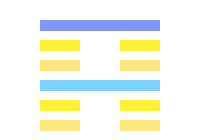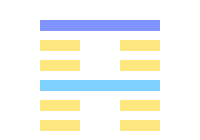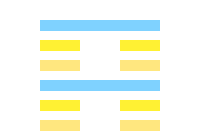52.2.5.6 (52 > 48)

52.2.5.6 (52 > 48) - THE KĂN HEXAGRAM.
- 2. The second line, divided, shows its subject keeping the calves of his legs at rest. He cannot help (the subject of the line above) whom he follows, and is dissatisfied in his mind.
- 5. The fifth line, divided, shows its subject keeping his jawbones at rest, so that his words are (all) orderly. Occasion for repentance will disappear.
- 6. The sixth line, undivided, shows its subject devotedly maintaining his restfulness. There will be good fortune.
52.2.5.6 (52 > 48) - Stop
One advances while promising others to follow their advice.
Bing DeepL Google Yandex52.2.5.6 (52 > 48) - Stop
One advances while promising others to follow their advice.
Bing DeepL Google Yandex52.2.5.6 (52 > 48) - Kán, l’arrêt
Kán : ferme, tenir droit, bien réglé, arrêter, reposer
-
2. « Arrêter le mouvement des jambes ». (Ou les tenir droites et bien posées.) Si, devant s’arrêter, on ne peut aider celui qui marche devant soi, on doit en avoir du déplaisir.
On doit aider et se rendre au cri d’appel. -
5. Tenir ses mâchoires de sorte que les paroles sortent de la bouche avec ordre et mesure, cela exempte de repentir.
On sait ainsi conserver le milieu. -
6. Être tout appliqué à rester ferme dans le bien est une disposition très heureuse.
On peut ainsi être juste et droit jusqu’à la fin.
52.2.5.6 (52 > 48) - Cesser
On s'avance en promettant aux autres de suivre leurs conseils.
Bing DeepL Google Yandex52.2.5.6 (52 > 48) - Megállás
- 2. Ha a másik többet akar, nem tarthatja vissza.
- 5. Nem fejti ki kételyeit hogy ne okozzon nehézségeket.
- 6. Tanulmányozza környezete igényeit mielőtt foglalkozna azokkal.
The trigrams
The trigrams are combinations of three yin and yang lines. The three bottom lines of the hexagram form the lower trigram and represent the inner situation. The three top lines form the upper trigram and represent the outer situation.
Upper trigram: The mountain The water


Lower trigram: The mountain The wind


The formation: 52
What is already there

52 - THE KĂN HEXAGRAM.
When one's resting is like that of the back, and he loses all consciousness of self; when he walks in his courtyard, and does not see any (of the persons) in it, there will be no error.
Bing DeepL Google Yandex52 - Stop
One recognizes that it is time to stop because one needs to feed oneself.
Bing DeepL Google Yandex52 - Stop
One recognizes that it is time to stop because one needs to feed oneself.
Bing DeepL Google Yandex52 - Kán, l’arrêt
Kán : ferme, tenir droit, bien réglé, arrêter, reposer
Kan « ferme ». L’homme ferme tourne le dos et s’oppose résolument, sans tenir compte de lui-même. S’il traverse un endroit, il ne regarde pas qui y est et ne faillit point.
Texte
L’homme ferme s’oppose résolument (au mal) sans tenir compte de lui-même. Devant traverser un endroit, il ne regarde pas qui s’y trouve (mais le fait résolument) et ne faillit point.
Symbolisme
Deux montagnes superposées forment le Koua. Ainsi l’homme supérieur pense à ne pas dépasser les bornes de ses fonctions.
Commentaire
Kán signifie s’arrêter, tenir ferme, en bon ordre, agir ou s’arrêter selon l’occasion. Quand l’acte et sa cessation ont lieu en temps convenable, la conduite est belle et intelligente. « Rester à sa place », cela veut dire que les grands et les petits sont en rapport, mais sans usurpation ni entre-croisement. Celui qui est ferme et attentif à son devoir ne se recherche pas lui-même. Marchant dans son jardin, il ne voit pas même qui s’y trouve.
Note. Tout ceci illustre le sens « tenir droit, bien réglé » et se réfère aux rites du maintien extérieur qui prescrivent de se tenir toujours droit et de ne pas même s’asseoir sur un siège qui n’est pas droit.
52 - Cesser
On reconnaît qu'il est temps de s'arrêter car on a besoin de s'alimenter.
Bing DeepL Google Yandex52 - Megállás
Felismeri hogy itt az ideje megállni mert a többieket táplálni kell.
Bing DeepL Google Yandex
52.2 (52 > 18) - THE KĂN HEXAGRAM.
The second line, divided, shows its subject keeping the calves of his legs at rest. He cannot help (the subject of the line above) whom he follows, and is dissatisfied in his mind.
Bing DeepL Google Yandex52.2 (52 > 18) - Being attracted irresistibly
The other wants more, one cannot hold them back.
Bing DeepL Google Yandex52.2 (52 > 18) - Being attracted irresistibly
The other wants more, one cannot hold them back.
Bing DeepL Google Yandex52.2 (52 > 18) - Kán, l’arrêt
Kán : ferme, tenir droit, bien réglé, arrêter, reposer
« Arrêter le mouvement des jambes ». (Ou les tenir droites et bien posées.) Si, devant s’arrêter, on ne peut aider celui qui marche devant soi, on doit en avoir du déplaisir.
On doit aider et se rendre au cri d’appel.
52.2 (52 > 18) - Être attiré irrésistiblement
L'autre en veut plus, on ne peut pas le retenir.
Bing DeepL Google Yandex
52.5 (52 > 53) - THE KĂN HEXAGRAM.
The fifth line, divided, shows its subject keeping his jawbones at rest, so that his words are (all) orderly. Occasion for repentance will disappear.
Bing DeepL Google Yandex52.5 (52 > 53) - Hiding one's concern
One does not express doubts so as not to create difficulties.
Bing DeepL Google Yandex52.5 (52 > 53) - Hiding one's concern
One does not express doubts so as not to create difficulties.
Bing DeepL Google Yandex52.5 (52 > 53) - Kán, l’arrêt
Kán : ferme, tenir droit, bien réglé, arrêter, reposer
Tenir ses mâchoires de sorte que les paroles sortent de la bouche avec ordre et mesure, cela exempte de repentir.
On sait ainsi conserver le milieu.
52.5 (52 > 53) - Dissimuler son inquiétude
On n'exprime pas ses doutes pour ne pas créer de difficultés.
Bing DeepL Google Yandex52.5 (52 > 53) - Megállás
Nem fejti ki kételyeit hogy ne okozzon nehézségeket.
Bing DeepL Google Yandex
52.6 (52 > 15) - THE KĂN HEXAGRAM.
The sixth line, undivided, shows its subject devotedly maintaining his restfulness. There will be good fortune.
Bing DeepL Google Yandex52.6 (52 > 15) - Managing anger
One listens to others before getting carried away.
Bing DeepL Google Yandex52.6 (52 > 15) - Managing anger
One listens to others before getting carried away.
Bing DeepL Google Yandex52.6 (52 > 15) - Kán, l’arrêt
Kán : ferme, tenir droit, bien réglé, arrêter, reposer
Être tout appliqué à rester ferme dans le bien est une disposition très heureuse.
On peut ainsi être juste et droit jusqu’à la fin.
52.6 (52 > 15) - Contenir sa colère
On écoute les autres avant de s'emporter.
Bing DeepL Google Yandex52.6 (52 > 15) - Megállás
Tanulmányozza környezete igényeit mielőtt foglalkozna azokkal.
Bing DeepL Google YandexIn the making: 48
What is poised to happen

48 - THE 3INGHEXAGRAM.
(Looking at) 3ing, (we think of) how (the site of) a town may be changed, while (the fashion of) its wells undergoes no change. (The water of a well) never disappears and never receives (any great) increase, and those who come and those who go can draw and enjoy the benefit. If (the drawing) have nearly been accomplished, but, before the rope has quite reached the water, the bucket is broken, this is evil.
Bing DeepL Google Yandex48 - Tsing, le puits
Tsing : puits.
Tsing « puits ». On peut changer de place une ville, mais pas un puits. On ne l’acquiert pas, on ne le perd pas (il est ou il n’est pas). On y va, on en vient. S’il se dessèche, si sa corde vient à manquer, si le seau tombe au fond, ce sont autant d’accidents fâcheux. L’eau montant, le puits plein d’eau, c’est le sage qui exhorte et aide le peuple travailleur et besogneux
Texte
On peut changer de place une ville, mais pas un puits. On ne le perd pas, on ne l’acquiert pas. (Il est ou il n’est pas.) On y va, on en vient. Il est d’une grande utilité. Si l’eau se dessèche, si la corde casse ou manque, que le seau soit brisé, ce sont de fâcheux accidents.
Symbolisme
Eau par-dessus des arbres figure le puits.
Ainsi le sage anime le peuple et l’excite à l’affection mutuelle.
Commentaire
Le bois dans l’eau et au-dessus de l’eau figure le puits. Un puits bien ménagé ne s’épuise pas. Quand un de ces accidents arrive, c’est qu’on n’a pas fait ce qu’il fallait.
The nuclear hexagram: 40.1.6 (40 > 38)
The nuclear hexagram is the association of the two inner trigrams (lines 2,3,4 and 3,4,5). It represents the root, or the origin of the situation.

40.1.6 (40 > 38) - THE KIEH HEXAGRAM.
- 1. The first line, divided, shows that its subject will commit no error.
- 6. In the sixth line, divided, we see a feudal prince (with his bow) shooting at a falcon on the top of a high wall, and hitting it. (The effect of his action) will be in every way advantageous.
40.1.6 (40 > 38) - Giving the best of oneself
The weakest don't come because others have given them a better welcome.
Bing DeepL Google Yandex40.1.6 (40 > 38) - Giving the best of oneself
The weakest don't come because others have given them a better welcome.
Bing DeepL Google Yandex40.1.6 (40 > 38) - Kieh, la libération
Kieh : 1. Délivrer, faire échapper, échapper au danger ; 2. Disperser ; 3. Ouvrir, séparer, s’ouvrir. Se dit du mouvement de la germination. 4. Résoudre une difficulté, une complication.
-
1. Délivrer quelqu’un est chose excellente.
Quand le fort et le faible s’entendent selon la justice, il n’y a pas de faute à craindre. - 6. Si le prince est assez habile pour atteindre d’une flèche un faucon posé sur le haut d’un mur élevé, il aura le succès et saura disperser les rebelles.
40.1.6 (40 > 38) - Donner le meilleur de soi-même
Les plus faibles ne viennent pas car les autres leur ont donné un meilleur accueil.
Bing DeepL Google Yandex40.1.6 (40 > 38) - Módosítás
- 1. Fel akarja szabadítani magát, ez egy jó döntés.
- 6. Miután felkészül, meg tudja oldani a problémákat időben.
Ruler
The starting situation

52.6 (52 > 15) - THE KĂN HEXAGRAM.
The sixth line, undivided, shows its subject devotedly maintaining his restfulness. There will be good fortune.
Bing DeepL Google Yandex52.6 (52 > 15) - Managing anger
One listens to others before getting carried away.
Bing DeepL Google Yandex52.6 (52 > 15) - Managing anger
One listens to others before getting carried away.
Bing DeepL Google Yandex52.6 (52 > 15) - Kán, l’arrêt
Kán : ferme, tenir droit, bien réglé, arrêter, reposer
Être tout appliqué à rester ferme dans le bien est une disposition très heureuse.
On peut ainsi être juste et droit jusqu’à la fin.
52.6 (52 > 15) - Contenir sa colère
On écoute les autres avant de s'emporter.
Bing DeepL Google Yandex52.6 (52 > 15) - Megállás
Tanulmányozza környezete igényeit mielőtt foglalkozna azokkal.
Bing DeepL Google YandexCorrection
The direction where the ruler is going to bend

52.2.5 (52 > 57) - THE KĂN HEXAGRAM.
- 2. The second line, divided, shows its subject keeping the calves of his legs at rest. He cannot help (the subject of the line above) whom he follows, and is dissatisfied in his mind.
- 5. The fifth line, divided, shows its subject keeping his jawbones at rest, so that his words are (all) orderly. Occasion for repentance will disappear.
52.2.5 (52 > 57) - Stop
One knows of few cases where others have been satisfied with a given word.
Bing DeepL Google Yandex52.2.5 (52 > 57) - Stop
One knows of few cases where others have been satisfied with a given word.
Bing DeepL Google Yandex52.2.5 (52 > 57) - Kán, l’arrêt
Kán : ferme, tenir droit, bien réglé, arrêter, reposer
-
2. « Arrêter le mouvement des jambes ». (Ou les tenir droites et bien posées.) Si, devant s’arrêter, on ne peut aider celui qui marche devant soi, on doit en avoir du déplaisir.
On doit aider et se rendre au cri d’appel. -
5. Tenir ses mâchoires de sorte que les paroles sortent de la bouche avec ordre et mesure, cela exempte de repentir.
On sait ainsi conserver le milieu.
52.2.5 (52 > 57) - Cesser
On connaît peu de cas où les autres se sont contentés d'une parole donnée.
Bing DeepL Google Yandex52.2.5 (52 > 57) - Megállás
- 2. Ha a másik többet akar, nem tarthatja vissza.
- 5. Nem fejti ki kételyeit hogy ne okozzon nehézségeket.

